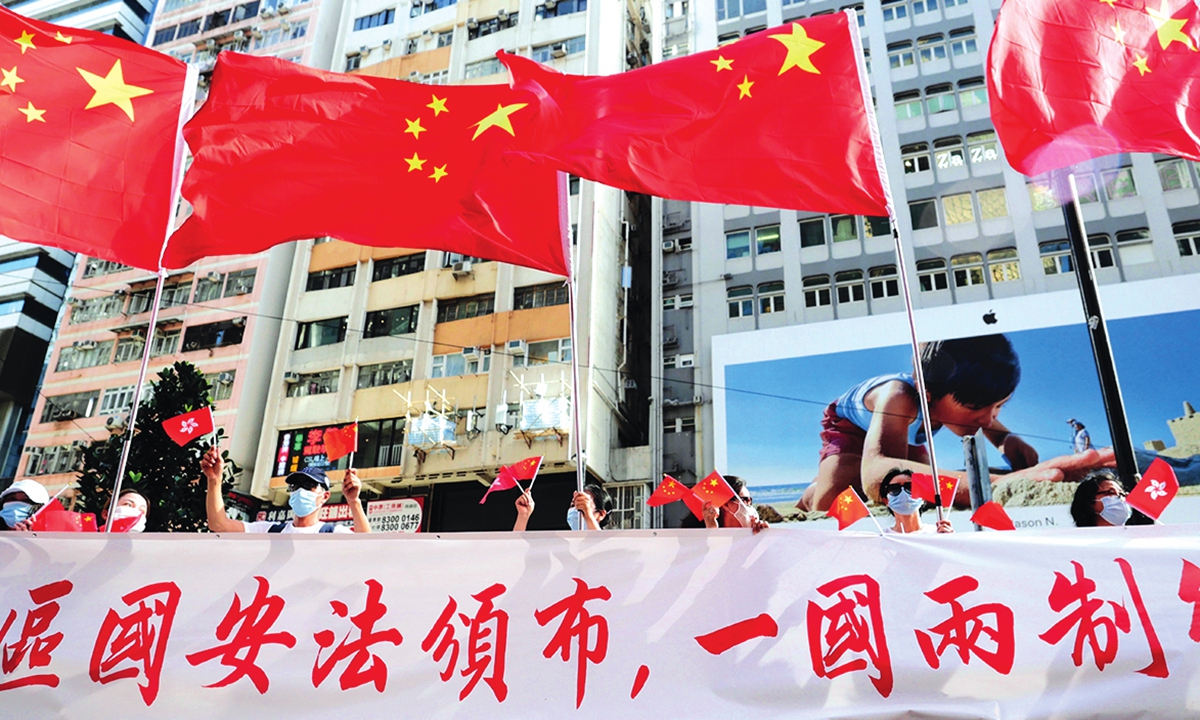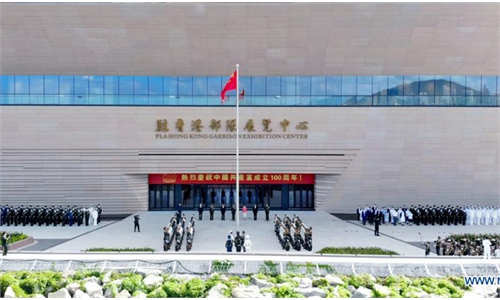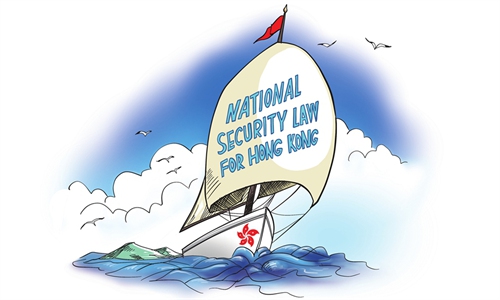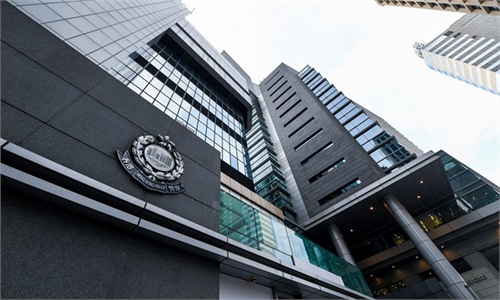
Hong Kong residents support the enactment of the National Security Law for Hong Kong at Causeway Bay on June 30, 2020. Photo: Xinhua
Several Hong Kong lawmakers recently asked the local government to investigate and ban the illegal cult Falun Gong, which is increasingly suspected of being part of the city's latest terrorist incidences in July, including the heinous lone wolf-style attack of a police officer, and a series of attempted bomb attacks.
Chris Tang Ping-keung, Commissioner of Police of the Hong Kong Police Force (HKPF), responded to lawmaker Elizabeth Quat Pui-fan on the Legislative Council on July 7 that the Hong Kong government will undoubtedly deal with organizations that endanger national security in accordance with the law. The police will investigate the role of Falun Gong, or any other groups suspected to be involved in the police stabbing case, Tang said, according to local media Takungpao.
The Hong Kong police has ferreted out Falun Gong-backed violence-inciting publications at the secessionist organization "Returning Valiant," which orchestrated the making of bombs by teenage students and subsequently planned a series of attacks, Takungpao reported on July 8. Falun Gong was also involved in the police stabbing case, it added.
Anti-China groups that are engaged in terrorist attacks and separatist activities under the guise of religion in Hong Kong have severely threatened the region's security and stability, observers found.
The Hong Kong police force is stepping up efforts in tracking and cracking down on these groups. The Website of the notorious Presbyterian Church in Taiwan (PCT), a Taiwan island-based separatist group that preaches "Taiwan independence" and supports the rioters in Hong Kong under the banner of religion, was purportedly blocked in Hong Kong recently. It was one of the websites banned by the Hong Kong police for spreading secessionist information and inciting violence after the national security law for Hong Kong took effect a year ago, according to Hong Kong media.
PCT was found working with Hong Kong's separatist radio host Wan Yiu-sing (aka "Giggs"), who was placed under arrest on suspicion of funding the rioters attempting to split the country and helping them escape to the island of Taiwan. In a written judgment the Hong Kong High Court issued on Wan last month, the court pointed out that Wan "had close ties" to Taiwan's secessionist forces including the PCT, Taiwan media Central News Agency reported on May 14.
Like PCT, some separatist political groups in Hong Kong and Taiwan regions have long colluded with each other, and are active in the illegal, violent events that have occurred in Hong Kong in recent years, found observers and residents.
"Religion is a good excuse," said a Tianjin-based expert on Hong Kong and Taiwan studies surnamed Li. Many cases in the past have shown that political activities under the guise of religion have proliferated in Hong Kong, not to "spread the gospel" but to split China and interfere with Hong Kong, Li told the Global Times.
'Helping hand' in Taiwan
PCT, a self-claimed religious group mainly engaged in "medical, evangelistic, educational, and social services" in Taiwan, was reported to have openly supported the black-clad rioters who caused social unrest in Hong Kong on several occasions and has also mobilized various resources to help suspects abscond to Taiwan to escape justice under the national security law.
According to the Hong Kong-based newspaper Oriental Daily News, Wan launched the so-called "Thousands of parents help students study in Taiwan" online fundraising campaign to help thugs in Hong Kong flee to Taiwan, with HK$4 million ($515,531) being transferred to the PCT account.
PCT clearly stated on its website that the important items of their "church's work" include encouraging demonstrations throughout Taiwan in solidarity with violent protesters in Hong Kong, providing street protection and communication materials for rioters, and providing required assistance for "long-staying Hong Kong residents" on the island.
The Chi Nan Presbyterian Church in Taipei, for example, an offshoot of the PCT, actively practices the spirit of its general headquarter by providing significant financial and material support to violent protesters amid Hong Kong's social unrest in the past years, and was even more active in helping convicted rioters abscond to Taiwan through smuggling and other means.
According to Hong Kong media, since the turmoil started in Hong Kong in June 2019, Huang Chun-Sen, senior pastor of the Chi Nan Presbyterian Church, has been contributing money and marshaling efforts to support the rioters in Hong Kong and has also publicly admitted to helping over 200 rioters leave Hong Kong illegally.
In an interview with Radio Free Asia, Huang said that by the end of 2019, the Chi Nan Presbyterian Church had raised more than NT$15 million ($543,200) in total to support protesters in Hong Kong and to resettle Hong Kong thugs smuggled into Taiwan.
According to BBC, the Chi Nan Presbyterian Church had often served as a "supply depot" for Hong Kong rioters in Taiwan behind Hong Kong's turmoil, with Huang transporting collected gas masks, goggles, and helmets in batches from Taiwan to Hong Kong to support violent demonstrations.
The Global Times found that these two "religious groups" have been extraordinarily keen on political issues and have been closely linked to the secessionist Democratic Progressive Party (DPP) of Taiwan island in an attempt to split and subvert China under the guise of "religion" and "human rights" related slogans.
Founded in 1951, PCT once had several mainstay "Taiwan independence" forces as its members including Lee Teng-hui, former Taiwan leader and key initiator of Taiwan separatism. In August 1977, the church issued the so-called "Declaration of Human Rights" and instigated then Taiwan authorities to "make Taiwan a new and independent country."
Including PCT and its branches, the organizations that engage in separatist wrongdoings in the name of holding "religious activities" have been scorned by the island's mainstream religious groups and general believers. Many local congregations reached by the Global Times said they were disgusted at the PCT's dishonorable behaviors.
"As for the PCT, I only see their political intrigues but not their religious beliefs." Jane Wu, a 28-year-old Christian living in Taipei, told the Global Times.
Incite violence in Hong Kong
In Hong Kong, local congregations also decry the secessionist "churches" that attempt to stir up troubles in the city together with rioters.
"I personally don't know much about politics, nor am I interested in it," a Christian surnamed Yeung said to the Global Times. "I have no idea what they [separatist religious groups] want to do, but they've made me feel insecure sometimes."
According to some religious believers in Hong Kong, as well as the Global Times reporters, observations, there are a few self-claimed "religious groups" that were specifically founded in the color revolution-like movements, such as the "anti-extradition bill protests" in 2019, and the earlier "Occupy Central" in 2014. Obviously, they were set up not for some religious goals but as part of the conspiracy to split the country, observers noted.
The HK Pastors Network, initially known as Hong Kong pastors joint declarations committee, was a separatist group founded in 2019 to organize and support anti-extradition bill events. One of its appeals was to "ask the government to withdraw the extradition bill," the group said on its Facebook page.
Even today, the group keeps holding "prayer meetings" online, at which anti-China forces never tire of glorifying violence, and smear the government's efforts against the rioting as "political persecution."
Umbrella City Cyberchurch (UCC), founded in 2014 amid the "Occupy Central" chaos, was also found to fund the mobs and organize rallies in support of the riots in 2019. In the second half of 2019, it frequently spread rumors slandering the Hong Kong government and the police on social media, and posted riot information with times and maps, calling on others to "go to the street," the Global Times found.
Instead of religion-related content, UCC wrote "[a] self-targeted revolution" on the cover picture of its Facebook page. The stance and behaviors of the groups like the HK Pastors Network and UCC have distinctly deviated from the religious sphere, scholars in Hong Kong issues pointed out.
Long rooted in the Hong Kong community, the religious groups may be influenced by various trends of thought, with a pluralistic political hue, Li said. "Religion itself is characterized by hidden cultural conflicts, and if narrow political aims and prejudices are wrapped in this foundation, it makes many issues more complicated and confusing," Li told the Global Times.
"But no matter what the nature of the organizations, they must accept legal sanctions if they have broken the law," he noted.
Religious freedom under protection
One year has passed since the national security law for Hong Kong came to effect. Some extreme separatist forces were brought to justice during the year, and many Hong Kong residents reached by the Global Times said they feel a notable improvement of social order in the city.
The law can limit and restrain the secessionist "church" forces, said legal experts. "Article 43 of the national security law for Hong Kong empowers local law enforcement agencies to take action to prevent, suppress offenses endangering national security, which includes strengthening internet supervision," Tian Feilong, an associate professor at Beihang University's law faculty and a member of the Chinese Association of Hong Kong and Macao Studies, told the Global Times.
The Hong Kong police, therefore, have a legal basis to block access to PCT's site, as well as the websites of other illegal, anti-China organizations, Tian said.
Significantly, in contrast to some separatists' defamation of "violating religious freedom," both the security law and the Basic Law of Hong Kong well protect the normal religious activities in the region, said Tian.
"The laws actually provide a legal guarantee for Hong Kong's religious freedom through drawing a clear distinction between legal and illegal activities, which protects general congregations from being deceived or utilized by some lawbreakers posing as legal religious groups," he added.
In June 2020, days before the security law took effect, the liaison office of the central government in Hong Kong met more than 50 local religious leaders and representatives, Hong Kong media reported. At the meeting, the office's deputy director, Tan Tieniu, noted that the freedom of religious belief as stipulated in the Basic Law will continue to be protected, and it won't be changed by the national security law for Hong Kong.
What the national security law targets are the criminal acts that attempt to undermine Hong Kong's prosperity and stability, Tian said. "It safeguards Hong Kong's legal system and firmly protects citizens' legitimate rights," he said.




